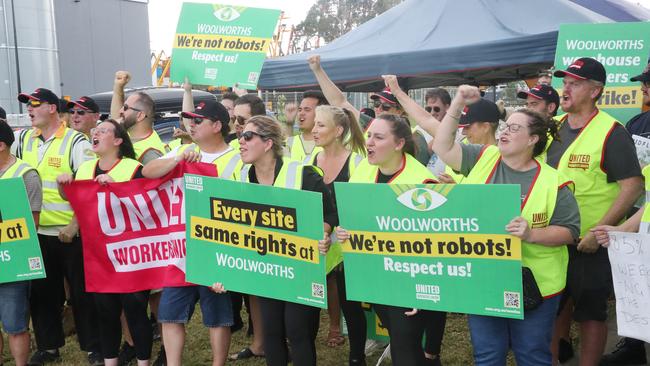Wesfarmers CEO Rob Scott worried about economic hit from Woolworths strike
Wesfarmers CEO Rob Scott is growing increasingly concerned about the strike by Woolworths workers that is leaving shelves empty and threatens to spill into higher supply chain costs, inflation and a spike in the cost of living for families.
Wesfarmers chief executive Rob Scott is increasingly alarmed about the rise in industrial action as reflected in the current bitter dispute between Woolworths and warehouse workers that has left supermarket shelves empty, warning rising supply chain costs will feed inflation to hurt Australian families “at the worst possible time”.
The boss of one of Australia’s largest companies, which owns a portfolio of retailers like Bunnings and Kmart, also raised his concerns that some people were looking to blame the retailers amid the cost-of-living crisis as a deflection.
Speaking to The Australian on Thursday, Mr Scott reflected on the weeks-long picket lines and strike at a number of Woolworths distribution centres orchestrated by the United Workers Union to see it as part of a worrying trend in Australia that is starting to spread and which now threatened to worsen cost-of-living pressures for consumers.
“It is really concerning seeing industrial action like this, I’m not across the specific details of that matter (Woolworths), but, yes, there does seem to be an increasing level of industrial action.
“And you know, ultimately the consequence of these actions is that it’s going to increase the costs of supply chains,” Mr Scott warned.
“It increases the costs of products for consumers at the worst possible time. So the inflationary and cost pressures of these actions are going to hit families.”
Rising levels of vitriol at picket lines at a number of Woolworths distribution centres was triggered after the UWU commenced indefinite strike action at the four distribution sites on November 21, with the strike action costing Woolworths more than $50m in lost sales and beginning to erode its first-half earnings. Woolworths says the UWU is seeking pay increases at these sites in excess of 25 per cent over three years, materially above inflation, at a time when Woolworths is actively working to keep food and groceries affordable for customers facing ongoing cost-of-living pressures.

Mr Scott, who runs one of Australia’s largest companies and which operates many distribution centres of its own for its businesses such as Bunnings, Kmart and Officeworks, said the cost of running supply chains that sprawl across Australia were already high and these types of industrial actions could make that worse, with the end consumer ultimately paying the price.
“So supply chain costs in Australia are already quite high. And if we see much higher levels of cost, and also, combined with further disruptions from industrial action, that’s ultimately going to increase the cost of products for households.”
Mr Scott declined to comment if he had personally spoken to Woolworths chief executive Amanda Bardwell through this industrial action.
Woolworths has filed an application for Fair Work Commission orders to clear the UWU picket outside a key distribution centre in Melbourne’s Dandenong South, and the supermarket giant will face off against the unions at a hearing before the FWC on Friday.
Meanwhile, UWU members have blocked the site entry points with cars and protesters, and the company has blamed the union for creating an unsafe environment for employees.
The strike and picket lines have caused huge disruptions to Woolworths supply chain and seen its supermarket shelves depleted of groceries, with many shelves emptied as the industrial action interrupts the normal and efficient flow of food and groceries.
Mr Scott was reluctant to comment on the amount of public criticism and political heat around the $120bn supermarket sector – which has seen supermarket bosses dragged before Senate and ACCC hearings – but said in poorer economic times, some people did look for others to blame.
“I don’t want to comment on other companies. I’d say that during times of cost-of-living crisis, often people like to deflect the blame, and unfortunately, retailers can be the target of that.” Wesfarmers once owned Coles but spun it out in late 2018.
It comes as inflation in Australia remains stubbornly high and recent economic statistics showed Australia’s longest per capita recession had deepened with sliding growth delivering what has been labelled a “sad economy without much hope”, reliant on record government spending to avoid heading in reverse.
Recent national accounts data released by the Australian Bureau of Statistics fell short of economists’ expectations, with the economy expanding by a tepid 0.8 per cent in the 12 months to September, and down from 1 per cent in June.




To join the conversation, please log in. Don't have an account? Register
Join the conversation, you are commenting as Logout